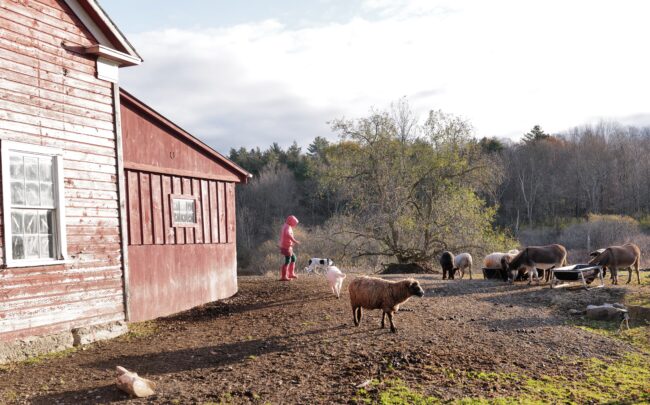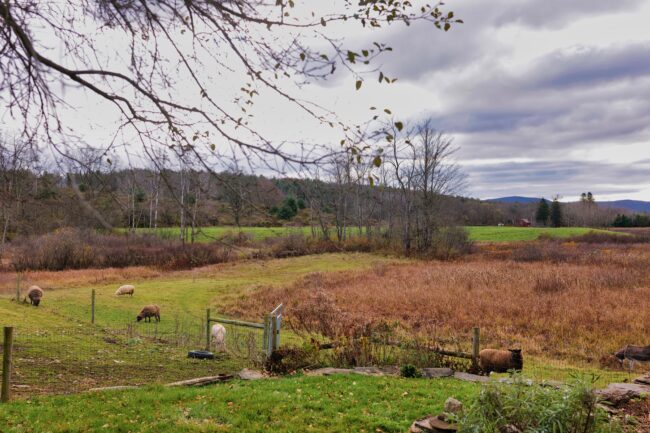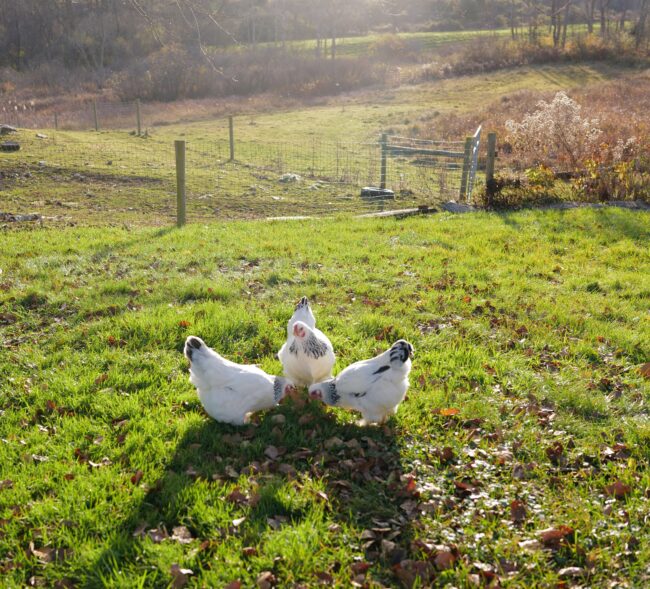Several thoughtful, honest, and concerned people have messaged me to ask why we won’t do more to protect Zip by confining him at night in the barn or elsewhere. The messages were exciting and raised important questions.
I’m struck by the civility and respect of these messages, and I was especially touched by this one from Pam, someone new to me. I want to thank her for the tone she set.
Pam is one of those people who gives me hope that we can learn to speak to each other in America again, even when we disagree.
Thanks, Pam. We disagree, and I think you and others deserve an explanation, even though I have tried to explain it several times. Zip has shaken things up here.
I should add that I don’t tell others what to do or believe everything I do is right. I do my best to leave everyone to make their own decisions and try to respect them. I don’t seek to change anyone’s mind, to explain mine.
Do I think it’s anyone else’s business? Yes, in this case, I do.
From Pam:
“I don’t mean to be disrespectful, but I don’t understand why you wouldn’t exercise the same caution for a cat as you do with your dogs. I adopted one cat who was allowed to roam all night and was hit by a car and suffered a broken jaw, a broken humor, and a broken hip. I adopted another who was allowed to roam all night, who was attacked by a predator and lost her back leg. I live in a rural neighborhood where there are many barn cats—those who are Locked in the cozy barn at night stay alive—those who are not locked in don’t last very long— between coyotes, bobcats, and owls, even the savvy ones have the odds stacked against them. I see you as loving guardians, but I do not understand why this lovely kitty is not protected as you protect your other animals in such admiral ways.” — Pam
____
There is nothing disrespectful about your message, Pam; here, as best I can, are the reasons Maria and I share for not wanting Zip in the house or to confine him at night elsewhere.
First, and most practically, the barn is too big and open to secure; it would be impossible and expensive to confine him there. We have had barn cats that lived to be 15 and 16 without living or sleeping in the house (as they got older, we let them come into a heated cat house in the basement in subzero weather). As most of our readers know, we had some trouble.
Besides that, Zip’s appearances are not regular; he comes and goes at odd times. He is not always there for us to confine. We do understand the dangers.
Mother, the barn cat from the first Bedlam Farm, ran off and disappeared when we moved to the current farm.
Minnie, who came to us as a feral kitten, was attacked by a predator and had to have a back leg amputated, just as yours was. She recovered and lived a long and peaceful time. Flo stayed outside and lived to be at least 16; we’re not sure of her age, but the vet estimated it. She never wanted to come inside until she was ancient.
From my research and after talking to vets, I’ve found that it is not true that all barn cats live short lives.
Two vets I’ve spoken with in the country tell me that barn cats who are cared for – fed and vaccinated and provided health care and shelter – live longer than house cats, partly because they have physical activity, are fed regularly, and are given attention and a safe and dry place to sleep.
There is also evidence that they are healthier when they eat some of the things cats naturally eat.
Pam has a lot of examples of barn cats being harmed, and I have a lot of stories about those who lived entire and free lives.
Our barn cats have all lived a long time. I understand there is a risk to any animals roaming at night, but I should mention that every home environment is different. What happens on one farm or house is not necessarily what must happen here.
Farms draw cats, and farmers can’t afford to care for them all. Most leave some milk for them but otherwise ignore them.
Our sheep are not confined at night. Our donkeys protect them; they are guard animals, so we have them. No animal here has ever been lost to a predator or coyote, even though the coyotes come so close almost every night that our dogs howl at them.
Cats are not dogs; the two species are very different.
Our dogs could not survive at night without being in bed and roaming in the pasture or the woods. One reason is that they are rarely permitted to run freely and learn how to survive; almost everything has to be done for them.
Cats are not as domesticated as dogs, and many – not all – are savvy and skilled at surviving. I admire that about them.
Zip lived outdoors for a year before we got him, and I see he is experienced and wise – he never goes near the road for any reason, stays close to the house and the barn, and roams the marsh.
I don’t see Zip as a “lovely kitty”; he’s a mature, intelligent, independent animal who enjoys freedom and is loved and cared for. I’m proud of giving him that life.
Our dogs do take risks. We can’t guarantee them a perfect life.
Border collies working around sheep are often injured; they suffer heat stroke, joint injuries, and bone injury.
They quite often die young. Working the way they do is in itself a danger sometimes.
Our dogs have never been on leashes, and they walk and run in the woods; they have run into bears, seen bobcats, and barked at nearby coyotes. We do not confine them or leash them in the country.
Dogs can be dogs here. Zinnia is a sweet Lab; she would rush to a coyote to make friends. But she still gets to walk in the woods.
On the farm, we have found that predators – hawks, bears, bobcats and owls, coyotes, and ferrets – do not come near the barn or the donkeys, whose shelter is just a few feet from where Zip sleeps at night.
Pam and I have philosophical differences about animals.
On Bedlam Farm, we cherish the idea that animals are animals, and where feasible, they should be given the freedom and respect of animals. We never confine our animals. We provide them with the option of shelter. But they get to go where they want inside of the pasture fence.
If we fed and confined Zip to the barn, he would no longer be a barn cat, and he would not have the opportunity to explore the farm at night and learn what is safe and what isn’t. The rats and mice would have a field day.
Zip would not be a barn cat but a house cat who slept in a barn.
That is different.
Barn cats hunt around the property for rats, mice, and moles. They keep rats from having offspring. Rats can spread disease and sicken out animals. Zip has real work to do.
One of their primary functions is to keep rodents out of the barn and away from the farmhouse. Limiting their movements at night would make that task difficult, if not impossible. How would they learn to hunt at night? People who do not have barns see it differently.
There is another practical issue: we don’t want Zip to live in the house or be confined in any way. We love his freedom of movement, love of exploration, and independence. He would be a nightmare in the house.
We don’t wish to emotionalize him or the process by treating him as humans would want to be treated or as household pets are treated. He isn’t a dog or anything like a dog, and I don’t wish to treat him as anything but an outdoor cat who has learned to take care of himself.
There are risks to life for humans or cats. I know people who died of cancer, got killed in a car crash, contracted a fatal disease, or had strokes and heart attacks.
Drunken drivers kill people all the time around here, and children die in gun accidents. But we don’t hide away; we live our lives.
So do animals.
I do not believe my job as a steward is to guarantee a life for Zip that is free of freedom or danger or the reality of living.
We all have to face the realities of life. We have risks – tetanus, ticks, kicks, icy roads, extreme cold, and spider bites. We take risks living on a farm in a remote corner of upstate New York.
We believe we are giving Zip the life he wants and deserves, and yes, there are risks, just as there are to anyone who gets into a car or, in modern-day America, goes shopping at Walmart.
Jack London wrote what I think is the best book ever written about dogs in his classic Call Of The Wild.
The story follows Buck—a mix of St. Bernard and Scotch collie—throughout his journey as a sled dog. Buck is the anthropomorphized main character in Jack London’s The Call of the Wild.
Buck undergoes a profound physical and mental transformation from being a spoiled dog from a wealthy family to a toiling sled dog to a wild wolf dog.
His human is murdered, and Buck seeks vengeance and then lives a life of freedom and independence.
I love The story because London does not see dogs as furbabies or homegrown therapists. Buck is a dog, at heart, a wild thing who faces danger daily and kills when needed, as dogs have done for thousands of years.
One day, I might have to write that Zip went off at night and never returned. That is the life of the barn cat. And people will fault me for not keeping him safe.
But as a dog, they were meant to be free until humans decided they wanted them to be something more. I feel the same way about Zip.
Pam, I don’t think our reasoning is impossible to understand. I don’t think it’s your philosophy. You have every right to think differently from me, you and most people do. I appreciate your manners and civility. Good luck with your cats.
I suspect you won’t be changing your mind, which isn’t my purpose. I don’t try to do that. But I hope you understand my reasoning. And thanks again for being pleasant and thoughtful.





Absolutely clear and nicely said. Pam also wrote a clear and nice post. Thank you both.
This was a good example of how to communicate online, on both ends..
Loving this post! Pam’s nice thoughtful message and your reply……is what *gentle warmth, creativity and civil and respectful discussion* is all about. May we all enjoy more of that throughout our daily lives!
Susan M
Good advice, I see that I respond well to people who are civil and thoughtful. I love to disagree and argue niceluy about it..it’s unusual on social media, but I’m working on it..
And you are doing very well on that front, Jon (IMO)………… VERY well!
Susan M
🙂
I agree with your point of view re: dogs and your barn cat. I’m pretty sure the majority of Americans do not, though I have no statistical data to back that up. I deeply appreciate that you and Pam can disagree in such a respectful and thoughtful manner. So-once again, thank you – and Pam.
Thanks, Jon, for taking the time to very civilly and thoroughly express your beliefs. I appreciate it very much and do understand your perspective, even if it is different from my own.
Even though we may have some different ideas on a few issues, I very much respect your and Maria’s responsible commitments to getting a cat who has been neutered, to having annual vet checks, to providing a good shelter and food and of course your love. Thank you for all that and for taking the time to express your thoughts. Your animals are lucky to have you two!
I’m lucky to have you in my world, Pam, I am much encouraged by your sensitivity and candor, and the gentle but forceful way you express yourself. I’d be grateful to hear from you again. This is how it ought to work in a free and civil society. Please stay in touch and thanks again. It’s good for me, and hopefully, for you.
What I find the most appreciative, is your stance on communication. You are willing to “listen” and appreciate those that can actually express an opinion in a decent way. Kudos to both you and Pam. Far too many “keyboard” warriors in this world. I know we don’t always have the chance these days to communicate in person, so many of us do most of this from our phones and computers. Manners is not just for one to one in person communication, it should be reflective in all of ones daily life. It costs us nothing and it makes life far more enjoyable!
I’m working on it, Christine, thank you for seeing it..
This is a great post! And could serve as an example on multiple forums..
Thank you
This was, by far, the most civil “we agree to disagree” discourse I’ve ever read or heard. This belief that if only others believe as we do, we will all be “safe,” is how man’s inhumanity to man continues globally. We are in the throes of that all over the world. And for what? Mere dominance. Not sure it will ever go away, yet a discourse like this gives me hope that it could be possible.
Had to comment on this discussion. Not the topic but the discussion. It was very evident that you were both th speaking from a position of concern for the other person’s view which seems to be sorely lacking in most discussions I see in the media at all levels these days. Refreshing to see two people can still voice their opinions about a topic using this position!!
Dear John, I have a question for you to help me with my very sensitive husband. I am also a lifelong animal lover and dog trainer. My problem is about a new stray boy cat who is brilliant and classy and loves our dogs! He is a hunter and brings lizards and a few birds up to our screen porch since I have welcomed him to live here. I rescue the critters who are still alive and relocate, and yes, I am troubled about anoles and birds especially because I love them. But for the past 30 years of a wonderful life here, all our indoor/outdoor cats have killed birds, snakes and lizards, and only a few rodents. I saw this stray boy for about a week hunkered down by the garage of neighbors (who have 24/6 outside dogs who are, sadly, aggressive. So I could bot NOT feed this boy and he’s been happily living freely around our property and sleeps in our screen porch (a doggie/cat flap opens in the porch door. I deal with the nature of cats and as uncomfortable as it is for me when they kill birds especially I know cats are here to stay and I do my best for them and have dearly loved every one I’ve had. As a thoughtful caring man, would you have some words from experience how my husband might have less anger and discomfort about cats and the sad truth that they are a problem with the killing of songbirds? I do not attempt to change his mind, and it may just have to remain this way for him. I have as much compassion for his angst as I do for the welfare of my dogs, cats, the songbirds I feed, and my beta fish (!) I also have a family of very friendly barred owls. I love my home and I dearly appreciate you and Maria!
Suzi, I sympathize, it’s a tough situation for you, if your husband is concerned about birds, I’m not sure there is anything I can do to help, it’s his decision. Some people I know put bells on the cats so the birds can hear them coming. I think we all have to follow our own conscience about that, and good luck with it.